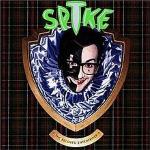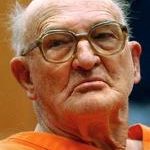 I think my wife, or soon-to-be wife, bought the Elvis Costello album Spike for me for Christmas. It was a good present, because I was a big Costello fan. Since that time, I haven’t actively sought out his music. The albums before, King of America and Blood & Chocolate, are probably my favorites of his. Spike was a disappointment following them. I find it an uneven album. In particular, the hit off the album, “Veronica” is quite weak, and is indicative of Costello’s worst habits of songwriting with its kaleidoscopic melody and impenetrable lyrics that require him explaining them to you.
I think my wife, or soon-to-be wife, bought the Elvis Costello album Spike for me for Christmas. It was a good present, because I was a big Costello fan. Since that time, I haven’t actively sought out his music. The albums before, King of America and Blood & Chocolate, are probably my favorites of his. Spike was a disappointment following them. I find it an uneven album. In particular, the hit off the album, “Veronica” is quite weak, and is indicative of Costello’s worst habits of songwriting with its kaleidoscopic melody and impenetrable lyrics that require him explaining them to you.
I’ve always been a big fan of Costello’s overtly political songs. The best, off Punch the Clock, is probably “Shipbuilding.” I just learned that the music for the song was not written by Costello but rather Clive Langer. That’s interesting because I’ve always thought it one of his best melodies.
Spike included two political gems. The first is “Tramp the Dirt Down.” I can’t be objective about that song. I despise Margaret Thatcher as much as Costello does. But in an objective light, if it hadn’t been her to bring social Darwinism to England, it would have been someone else. Sometimes, countries go on tilt and decide that the problem is that the poor are doing too well and the rich just aren’t rich enough. So they “choose” a despot. Thatcher’s defense of Augusto Pinochet was no accident; despots love each other, even if they appear different in long established “democracies” than they do in fragile South American military dictatorships.
But the song that most impressed me on Spike was, “Let Him Dangle.” It is about the execution of Derek Bentley and more generally the “angry mob” basis of the death penalty. The story is well known in England, but not so much here in the United States. Bentley was a marginally mentally retarded 19-year-old man. After losing a number of jobs due to physical problems and unsatisfactory work, he was refused military service because he was judged “mentally substandard.” Not that I place much credence in these tests, he had a 77 IQ score.
Bentley and his 16-year-old friend Christopher Craig attempted a burglary of a warehouse. They were seen and the police arrived. It all resulted in a shootout, where Craig killed one office and wounded another. Bentley didn’t use any weapons against any of the police. But according to them, he said, “Let him have it, Chris.” Now this is interesting because if Bentley and Craig had been in a James Cagney movie, that might might have meant, “Shoot the copper!” But this doesn’t make a lot of sense. Bentley supposedly said this after the officer Craig wounded, Frederick Fairfax, said, “Hand over the gun, lad.” Regardless, this led to the wound, not the death. So the claim that Bentley was culpable in the later shot that killed Constable Sidney Miles requires a number of jumps in the causation chain.
Regardless of all this, by English law, Craig could not be given the death penalty because he was younger than 18. So they killed Bentley. But it wasn’t as though there was a huge cry from the people or even the political establishment that Bentley should hang. Over 200 MPs signed a petition in favor of Queen Elizabeth’s formal plea for clemency. But the then Home Secretary, David Maxwell Fyfe, 1st Earl of Kilmuir, refused it. He was politically ambitious and I suspect it is somewhat like John Kerry’s vote to authorize the Iraq War. And in the end, he wasn’t alone. I dare say the majority were for it. Then Prime Minister Winston Churchill seems to have been. I only mean to say that Bentley did have his defenders.
In To Encourage the Others, David Yallop argues that it wasn’t Craig’s bullet that killed the police officer. According to him, it was rather a stray bullet from another police officer. This doesn’t really matter, of course. The logic of killing Bentley went like this: he said something that caused Craig to shoot; this leads to more shooting by Craig; this leads to Craig killing Miles. If Yallop is right, the logic simply changes: Bentley said something that caused Craig to shoot; this leads to more shooting by Craig; this leads to the police accidentally shooting Miles. By the logic of the time, Bentley is still put to death.
Bentley has since been given a posthumous pardon, which means exactly nothing to him since he has been dead at the hands of the state for over 60 years. I question how important that symbolic gesture is to society. There is no death penalty in the United Kingdom today. But when it was abolished, there were still a third of the MPs who voted to keep it. There will always be people who want to kill for killing. And every time there is a publicized atrocity, the pitchfork crowd is out baying for blood. I think this is perfectly captured in Elvis Costello’s song:
Here in California, we have the death penalty, and it is still pretty popular. In 2012, we had the opportunity to repeal it, and 52% of my fellow state citizens said no. I don’t think it has anything to do with justice in any particular case. For people who support the death penalty, each execution is a kind symbolic act to suppress the outrage about murder. So when someone is executed, they are not executed for their crimes, but for all our crimes. I know people aren’t aware of this thinking. They claim it is about justice and some of them reference the Bible. But if it really is “an eye for an eye” then why aren’t all murders killed? Of course, the most twisted of people think all murders should be killed and quite a lot more. But such people clearly need help and the kind of pity they seem incapable of.






Honest-to-God, I never thought about that song too much. I always just heard it as OK, Neil Young’s "Cowgirl In The Sand" is better now, and paid more attention to the heavier political songs on the album. I dunno why that’s the radio staple from that album. Except the way Elvis sings "so cute" sounds really distinctively pissed-off, and it’s not overtly political so it’s more radio-fiendly than "Welcome To The Working Week."
Now that you’ve made me pay attention to it; I think you’re right; it’s about the femme fatale. And how Elvis finds women who trade on allure to really be annoying. Elvis found a lot of people to be really annoying, including flirts in green shirts. One would suggest that hanging out with fashionable people who played the I’m-too-cool-for-you game was probably not how he should have spent his youth; he did, however, get a lot of mileage from being angry at these people. Why not? I am, too!
And the article isn’t a muddle. I just read it wrong, because one of my long-harbored dreams is to introduce people to music they don’t know.
When, as stated, I was a kid learning the rock-and-roll, one album I picked up at a a garage sale or something was "The Clash," by those guys. A friend heard me listening to it and said, mischievously, "you like this band?" Sure I do! "Did you know they had other records?" I sure didn’t. And so my friend took me to the record store and bought me a copy of "London Calling" with all the glee a pervert uncle would buy his nephew his first "Playboy."
So I jumped at the chance of "Elvis Costello fan? Who likes his later albums! Holy shit, now I get to be the smart one!" Not so fast, Slick. That will have to wait for another day. Unless you never bought that one Beatles record with the boring white cover; I’m here to tell you . . .
When I was a little kid, rock-and-roll was banned in my household. The Devil’s music, you see. Eventually my dad ended up bouncing in-and-out of mental institutions (quite sad for him, quite good for the rest of us, and don’t waste an iota thinking this is a tragic story, it ain’t) and I bought a CD player with my crappy-teenage-job wages.
So I needed some CDs; problem was, I knew nothing about the rock-and-roll I wanted to try listening to. So I got one of those scam deals from BMG (get five free discs now!) and picked the discs out at random.
One was "Spike." That voice (Elvis gets no credit for his voice; he’s a very expressive singer) hooked me immediately.
Now, I listen to it, and is it as good as Elvis’s early stuff. No. But is it good? Yes.
"Tramp The Dirt Down" IS harsh, and maybe unfair to Thatcher as just another in a line of conservative assholes. The story in it, though, about using a sick kid in a political ad, remains relevant. Whenever I see political ads using sick kids and saying how Obamacare wouldn’t have helped them, I spit through my gritted teeth and think of "Tramp The Dirt Down."
"Veronica" is really more interesting than it sounds. It was co-written by Paul McCartney, and so it has that perfect pop sheen. It’s actually about an aged, defenseless woman in a nursing home who is robbed and mistreated, because she can’t talk anymore. "They call her a name that they never get right, and if they don’t than nobody else will." That’s the McCartney of "Eleanor Rigby" and Elvis at their wicked, subtle best together. It’s a great song, and always makes me cry.
And that’s what Elvis did, at his best. He made tuneful songs that were slyly more subversive than their catchy melodies would suggest. He isn’t as full of them anymore as he was before he first landed a record contract, but who would be. He’s still good. "She wishes he was mute and not just dumb" from "American Gangster Time" made me jolt in my seat when I heard it the first time.
If you don’t know "My Aim Is True," you and the future wife are in for an absolute treat. Get that album and share it. It’s amazing.
I don’t have many heroes in this world, but Elvis is one of them. He’s never licensed a song to be used for an ad. He did a free concert in Saint Paul some years ago and implored the concertgoers, come up into the reserved, priced-tickets section. There are empty seats enough for all of you and you can see the band better. (Minnesotans being Minnesotans, we didn’t;
Elvis is awesome. And "Spike" ain’t bad.
@JMF – EC’s voice [i]is[/i] great and it has gotten better over time. I love the way he spit out lyrics on [i]Blood & Chocolate[/i]. It was about this period where he voice really became great. He was always an excellent singer, but it was when he really let fly that it became transcendent.
I know this article is a bit of a muddle, so it isn’t surprising that you got the wrong idea about my Elvis Costello fanhood. I owned at one time or another, every album up through [i]Brutal Youth[/i]. All the albums through [i]Blood & Chocolate[/i] I owned on LP first. I still own: [i]Almost Blue[/i], B&C, [i]King of America[/i], and a compilation.
I wrote about how I discovered EC in the first place:
[url=http://franklycurious.com/?…]Lyrics of "Watching the Detectives"[/url]
I also learned a lot about playing the bass from Bruce Thomas, who I think is an undervalued bassist. You would have to be great to play with EC, because by his own admission, he changes songs constantly. That isn’t a big deal for a drummer or a keyboard player, but the kind of bass lines that Thomas created are contrapuntal. The two of them seem to hate each other now, although I don’t think that’s the reason.
I’ve also seen him live a number of times, I think the last time was around [i]Useless Beauty[/i]. But I saw one of the greatest performances ever of him alone with Nick Lowe opening.
I’m afraid when I write about some artist I know really well, it often comes off as negative. But it is just because I have nothing to say about all the parts I like. They are given.
Take a look at that article; I’m curious what you think those lyrics are.
@JMF – I have the advantage of hearing this stuff more or less in real time. I would say that "Alison" and "Red Shoes" got more play on alternative radio stations. But it does seem that I recently heard "Watching the Detectives" in the supermarket. There are a couple of things about the song. One is that it works as word collage: you don’t have to understand what’s going on. The other is that the drums just sound so great. And that it is reggae without the Jamaican accent.
I understand the desire to turn people onto music. This is one of the reasons I keep pushing Brel: I have yet to get anyone interested who isn’t already as gaga as I am. I feel the same way about films, but with music it is more intense because you can share just a couple of minutes with people. Getting people to watch all four hours of [i]Seven Samurai[/i] at least a couple of times (because you just can’t get it the first time), is asking a bit much.
So here are a few that come to mind. Have you heard Husker Du?! What about Dead Milkmen?! And more recently, American Music Club?! Well, they are a band I was once totally obsessed with: for a couple of years I listened to almost nothing else. So they deserve a song:
Link missing.